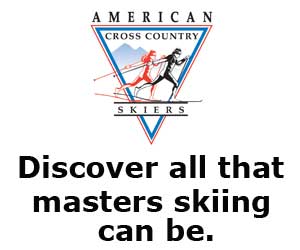
Canadian Babikov dominates men's 30K skiathlon race at Birch Hill
US Distance Championships
Sat, Mar 28, 2009 - By Matias Saari
FAIRBANKS — A handful of races-within-the-race provided the real drama at the U.S. Cross Country Ski Championships on Friday night — not Ivan Babikov’s expected domination of the skiathlon event at Birch Hill Recreation Area.
Babikov, a Russian-turned-Canadian, disappeared off the front after switching from classic gear to skating equipment in the 30-kilometer pursuit. He won the overall race by more than 90 seconds and hardly seemed winded at the end of the effort that will net him $1,200.
Since he’s not American, however, the U.S. championship came down to a duel between Leif Zimmermann (U.S. Ski Team) and James Southam (Alaska Pacific University).
Following them was a chase pack of five Americans and one Canadian, with the final spot on the U.S. podium up for grabs.
And then there was 18-year-old David Norris of Fairbanks in the thick of about 10 skiers shooting to be among the top 10.
Back to Babikov, however, who has countless wins in the domestic SuperTour series and has now claimed at least the last five U.S. Nationals races that he’s participated in.
“My birthday is actually the Fourth of July, Independence Day, so maybe that’s why I get lucky here,” said Babikov, who after a long process finally gained Canadian citizenship and moved his family to Alberta.
Babikov, who won an uphill World Cup race this season in Italy, proved that his supreme fitness — not luck — was the key to his win, as four times each he skated powerfully up the Competition Loop and Tower Direct climbs and left his competition gasping and losing ground in chunks.
But bad luck did keep Babikov off the start line for Tuesday’s 10K classic and Wednesday’s team sprint.
“I didn’t know there was a volcano going on ... so when I saw my flight (from Seattle to Fairbanks) was canceled, that was frustrating,” Babikov said about missing the classic race.
Then for the team sprint “my skis made it, but my duffel bag didn’t make it, so I didn’t have any boots so I couldn’t race,” he said.
Lars Flora of Anchorage said Babikov’s victory in 1 hour, 26 minutes and 3 seconds was no surprise.
“Ivan’s by far the strongest skier out of the whole pack, everyone knows that,” Flora said.
But the strongest American skier of the day had yet to be determined, as Zimmermann and Southam skied together for more than half the race. On the second of four skating laps, Zimmermann finally shook Southam to gain a 10 second-advantage that he increased to nearly a minute by the finish.
“It was a pretty gradual breakaway. It wasn’t like I just dropped him anywhere,” Zimmermann said. “It was a hard fight because he stayed close for a long time and I was going pretty hard.”
Once Babikov grabbed the lead, Zimmermann sensed he was racing for second place.
“We kind of tried to chase Babikov down ... but we knew pretty quickly that he was gone,” said Zimmermann, who finished in 1:27:40.
Southam couldn’t hang with Zimmermann, but did barely manage to keep the chase pack at bay.
That group included Flora (Saab Salomon Factory Team), Garrott Kuzzy (CXC), Brent Knight (APU), Bryan Cook (CXC), Chris Cook (USST) and Canadian Graham Nishikawa. The bunch finished fourth through ninth overall, in that order, after duking it out as a group.
“Out of the whole pack, Brent skied the best,” Flora said. “I think he was the strongest, but Kuzzy and I are little bit better with sprinting.”
Flora managed to fend off attacks by Kuzzy and Knight on the final climb and turn the race for bronze into a sprint between he and Kuzzy. Flora prevailed by 1.8 seconds.
Finishing another minute back in 16th place of 56 starters was Norris of Team FAST. His group included two-time Olympian Torin Koos (10th place) and Noah Hoffman, the nation’s top junior (13th place).
“It was easier to push hard with a group,” Norris said. “I probably wouldn’t have gone so hard if is wasn’t for knowing that you have to hang on.”
Getting dropped would have meant being isolated in no-man’s land, and Norris succeeded in staying with the pack until the final brutal loop.
The Lathrop High School senior was content with his standing.
“Regardless of the results, I’m satisfied,” Norris said. “I’m happy with how hard I went. I didn’t bonk or blow up or anything.”
Norris, like most of the others, now has about 41 hours to recover before entering the most grueling of all Nordic ski races, Sunday afternoon’s 50K classic.
“Today hurt and it was only 30K,” Zimmermann said. “Almost twice as much on Sunday is going to be tough.”
